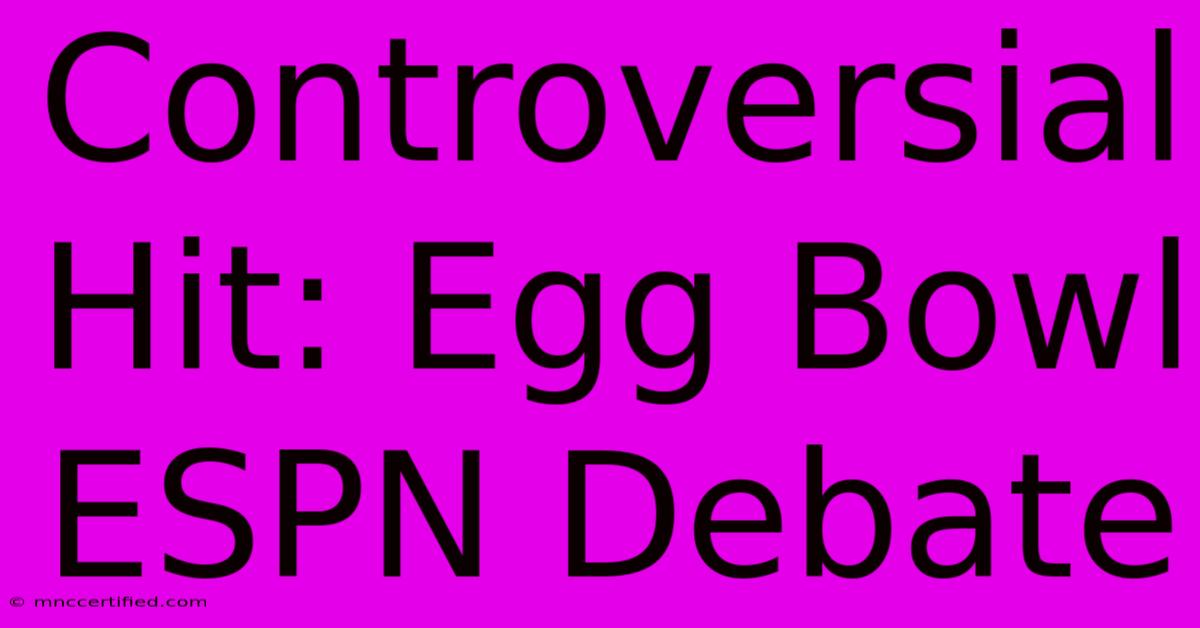Controversial Hit: Egg Bowl ESPN Debate

Table of Contents
Controversial Hit: Egg Bowl ESPN Debate Ignites Social Media Firestorm
The annual Egg Bowl clash between Mississippi State and Ole Miss is always a heated affair, but this year's game sparked a controversy that raged far beyond the stadium walls, igniting a firestorm on social media and fueling intense debate on ESPN. The focal point? A controversial hit that left fans, players, and analysts divided.
The Play That Sparked the Uproar
The pivotal moment occurred in the [Insert Quarter] quarter, with [Insert Score] on the clock. [Insert Player's Name], a [Insert Position] for [Insert Team], delivered a hard hit on [Insert Opposing Player's Name], a [Insert Position] for [Insert Opposing Team]. While some argued it was a clean, albeit forceful, tackle within the rules, others immediately labeled it a targeting foul, claiming it was a dangerous and unnecessary hit to the head or neck area.
The referees on the field made the call [Insert Referee's Call - e.g., no flag thrown, targeting penalty]. This decision, or lack thereof, immediately became the subject of intense scrutiny, with replays being dissected endlessly on social media and sports news channels.
Slow-Motion Analysis and Varying Perspectives
Slow-motion replays, analyzed endlessly by ESPN commentators and armchair quarterbacks alike, revealed different interpretations of the hit's legality. Some emphasized the violent nature of the collision and the potential for serious injury, highlighting the apparent helmet-to-helmet contact. Others argued the hit was a result of [Insert Player's Name]'s attempt to make a legal tackle, pointing to [Insert Justification - e.g., the player's lowered shoulder, the opponent's low posture].
This divergence of opinion highlighted the complexities of officiating in a high-impact sport like college football. The debate also underscored the subjective nature of judging such plays, with even experienced analysts expressing conflicting viewpoints.
ESPN's Coverage and the Subsequent Backlash
ESPN's coverage of the game and the subsequent debate further fueled the controversy. Analysts like [Insert Analyst's Name(s)] offered strong opinions, creating engaging but often divisive discussions. Their analysis, while insightful, also prompted significant pushback from viewers on social media, resulting in a flurry of tweets, comments, and online articles arguing for and against the call.
The Role of Social Media in Shaping Public Opinion
The speed and scale of social media's reaction were noteworthy. Twitter, Facebook, and other platforms became battlegrounds for fans expressing their outrage, disappointment, or support for the referee's decision. Hashtags like #EggBowlControversy, #TargetingDebate, and #[Insert Team Names] trended nationally, demonstrating the widespread interest and the passionate engagement of the fan base. The rapid dissemination of opinions, regardless of accuracy or factual basis, impacted the overall narrative surrounding the hit.
Long-Term Implications and Future Rule Changes?
The controversy surrounding the hit in the Egg Bowl raises important questions about officiating consistency, player safety, and the need for potential rule changes. The debate could influence future discussions regarding targeting penalties and the ongoing efforts to protect players from head injuries. The NCAA and other governing bodies might revisit the current rules in light of this incident and the subsequent public outcry.
Keywords: Egg Bowl, Mississippi State, Ole Miss, controversial hit, targeting penalty, ESPN debate, social media reaction, college football, referee controversy, player safety, rule changes, NCAA.
Conclusion: A Lasting Impact
The controversial hit in the Egg Bowl transcended the typical post-game analysis, evolving into a national conversation about player safety, officiating accuracy, and the role of social media in shaping public opinion. The lasting impact of this event will likely be felt both on the field and in the ongoing discussion surrounding the rules and regulations of college football. The game itself may be forgotten, but the controversy surrounding this single play will undoubtedly linger.

Thank you for visiting our website wich cover about Controversial Hit: Egg Bowl ESPN Debate. We hope the information provided has been useful to you. Feel free to contact us if you have any questions or need further assistance. See you next time and dont miss to bookmark.
Featured Posts
-
2024 Apple Black Friday Sale
Nov 30, 2024
-
Steinfeld Allen Announce Engagement
Nov 30, 2024
-
College Football Schedule And Picks
Nov 30, 2024
-
Best Air Pods Pro 2 Black Friday Price
Nov 30, 2024
-
Gold Bond Mattresses Reviews
Nov 30, 2024